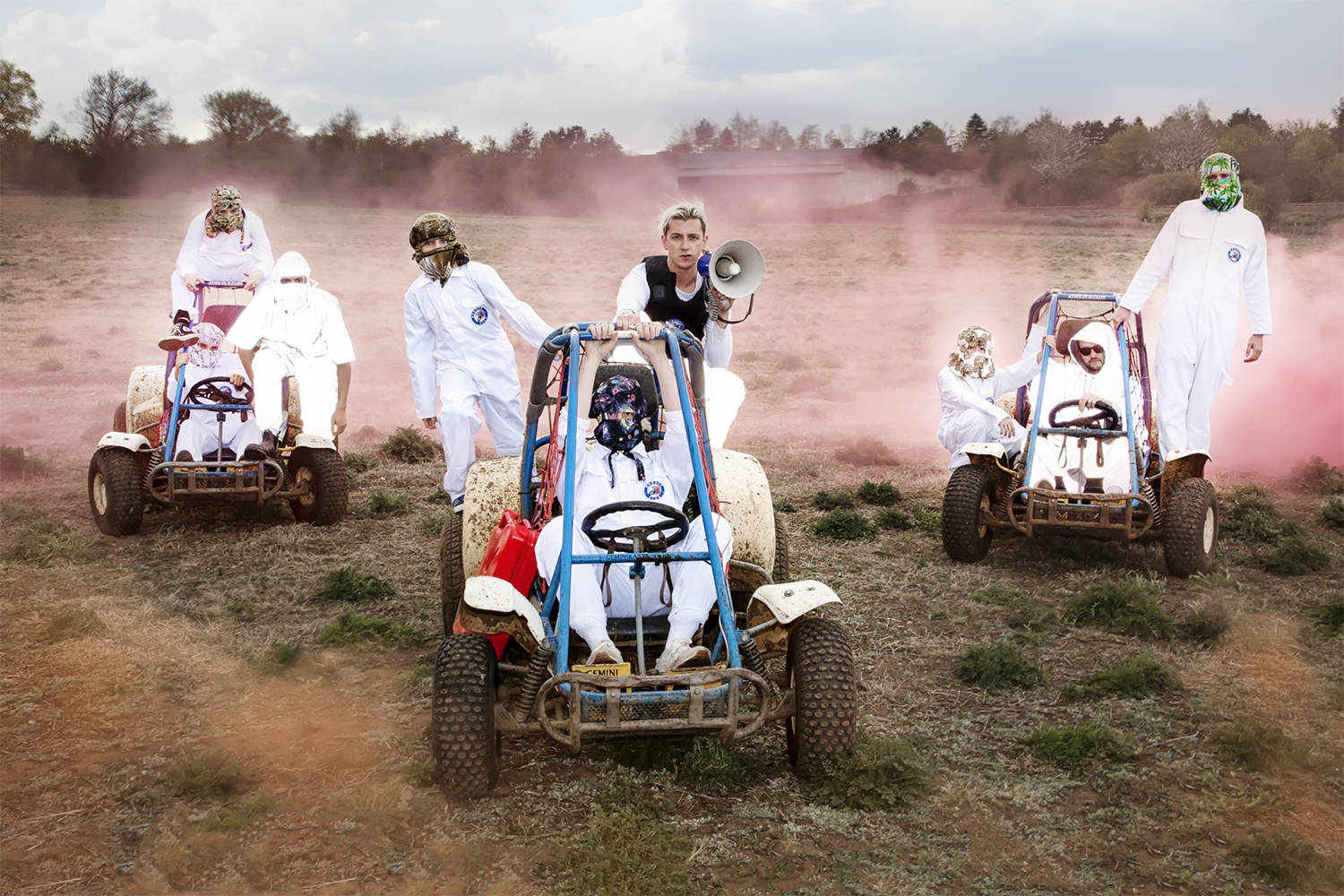Drones Club are pushing boundaries like few others. The unique London collective functions as “an ever-expanding organisation that’s very living, and is always open to new members.” Varying between three and six members, their electronic-infused compositions are just as melodic and upbeat as they are haunting and eerie.
Their ‘Rasa’ EP has just been released and, expectedly, ‘core’ members Charlie Dobney and Rory Cottam are happy it’s out for the world to hear. “It feels really good for that point to have protruded into the world,” Rory begins, from a countryside lodge in Suffolk near the end of a songwriting week away from the capital. “We see it as the crystallisation of an aesthetic that we’ve been working on for quite a while,” Charlie continues.
Since starting out little over a year ago, the ethos of Drones Club has been clear. “It came together very organically; the coming together of a few people, discussing similar things and deciding that there was something, an organisation that we could make to be an honest, sincere vessel for these ideas,” Charlie suggests eloquently.
The ideas that bought them together focus on the belief that “people have become numbed and alienated, and more like drones: the Drones Club is a method for people to reconnect with one another.” This type of analytical approach comes from making observations in everyday life. “It’s a natural by-product of living in this society and this environment,” Charlie adds. “It’s not necessarily a negative reaction or fallback – it’s more a desire to move forward.”
Drones Club like to stay covered up: their faces concealed behind balaclavas and bodies hidden under boiler suits. “It’s an old idea of not wanting ego to get in the way” is the reason they give for that air of mystery. One band in particular that has been a major influence on the Drones Club aesthetic is the Slovenian avant-garde group Laibach. “We really respect what they did; how big they created their world and their ambition of how important they wanted that world to be.”
With their own music, though, Drones Club aim to show “there will always be more than one facet”. ‘Soul of a Spaceman’, for example, is heartfelt pop fuelled by genuine emotion and Tallulah’s gospel-esque vocal. Comparatively, the ‘Rasa’ EP treads new ground, crossing multiple genres. Fusing elements, of techno, pop and electro together, Charlie suggests: “It should be a broader, holistic approach to making noise. Using elements of genre and noise almost like colour in a palette to produce a sensation of potential familiarity that represents our own ideologies.”
Moving from transcendental house to low-slung machine funk via meditative Balearic pop, they describe lead single ‘Shining Path’ as “a beam of light through the shadow”. The idea of ‘Feel No Pain’, meanwhile, is that “if people come together the pain that we experience will be lessened through the value of sharing it”. ‘Hissing Song’, additionally, boasts themes of enlightenment, religion and salvation – something the group want to convey.
Their set at Latitude was a memorable talking point. “Some of the ‘movers’ were handing out grapes and oranges as a gift of sustenance to people – it makes it feel like it’s a genuine transfer,” Rory suggests. As well as the gift of music, Drones Club offer something extra. “In as many ways as possible, we try to break down the barriers,” Charlie adds, “so it’s not just a crowd watching, what is essentially, a massive television at the end of a tent.”
Drones Club are no strangers to putting on impromptu performances, either. When they played at London’s Corsica Studios, they transformed the venue into their vision of a devotional, revolutionary space, with thick layers of smoke and chopped-up gospel music filling the air. Before that, they performed in a post-apocalyptic portacabin at the Arcola Theatre, handing out pamphlets during their set. At London Fashion Week they staged a guerrilla gig while decked out in balaclavas and boiler suits.
More recently, they played in the midst of the morning rush hour outside Oxford Circus tube station. “We played for half an hour and people were just standing next to us even though it was 8am,” Charlie recalls. Though they like to take spectators by surprise, Charlie and Rory insist “we’re never going in with a punk confrontation. That’s an aesthetic that’s been done and is for a different time – we’re not going out there to spit in someone’s face or make people angry.” Instead, their purpose is to try and genuinely exchange ideas and feelings with people.
“We just want to keep trying out new techniques and achieving new effects: reaching different conclusions with different techniques.” While there aren’t any concrete plans for an album just yet, Charlie and Rory agree: “I think you’re always working on an album, whether you say you are or not.”
As for the future of Drones Club: “What we’re looking to do is keep expanding this aesthetic and organisation to a point where we genuinely alter the way people perceive music, and what a band can or should be,” they agree with clear ambition. “We want to make a genuine cultural impact.” [sc name=”stopper”]
Taken from the October issue of Dork, out now – order your copy here. Drones Club’s EP ‘Rasa’ is out now.





